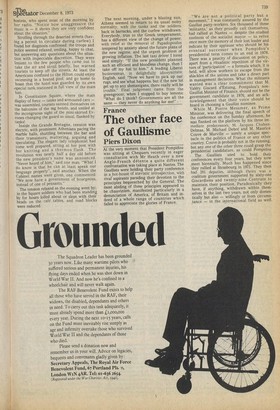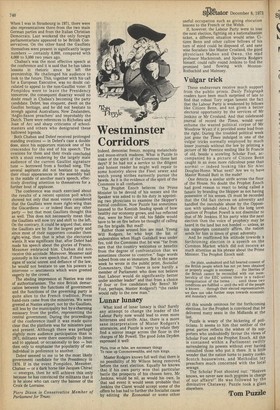France
The other face of Gaullisme
Piers Dixon
At the very moment that President Pompidou was sitting at Chequers recently in eager consultation with Mr Heath over a new Anglo-French détente a quite different confrontation was taking place at Nantes. The Gaullists were holding their party conference in a hot-house of atavistic introspection, with rival aspirants parading their devotion to the principles bequeathed by the General. The most abiding of these principles appeared to be chauvinism, manifested particularly in a denunciation of America, of Britain and indeed of a whole range of countries which failed to appreciate the glories of France. "We are not a political party but a movement," I was constantly assured by the Gaullist party-workers. Six thousand of these 'militants,' as they proudly call themselves, had rallied at Nantes — deSpite the .studied coolness of the socialist mayor — to relive once more the memory of their lost leader and indicate by their applause who should be his eventual successor when Pompidou's presidential term comes to an end in 1976. There was a paucity of discussion on policy, apart from a ritualistic repetition of the virtues of 'participation' — a formula which, it is
• held, will allow workers to escape from the shackles of the unions and take a direct part in management decisions. What the militants wanted was a clear commitment that M. Valery Giscard d'Estaing, Pompidou's nonGaullist Minister of Finance, should not be the government candidate in 1976, and an acknowledgement that their voice should be heard in choosing a Gaullist nominee. While M. Pierre Messmer, as Prime Minister, was delivering the final speech of the conference on the Sunday afternoon, he was flanked on the platform by his three immediate predecessors, M. Jacques ChabanDelmas, M. Michael Debrd and M. Maurice Couve de Murville — surely a unique spectacle in the politics of France or any other country. Couve is probably not in tbe running, but any one of the other three could grasp the presidential candidature, as could Pompidou
The Gaullists used to . hold their conferences every four years, but they now imeet biennially. Much has happened since they rallied at Strasbourg in 1971. They then had 281 deputies, although theirs was a coalition government supported by sixty-one Giscardiens and twenty-nine Centrists to maintain their position. Paradoxically they have, if anything, withdrawn within themselves in the last two years, not only domestically but also — willingly or from circumstance — in the international field as well. When I was in Strasbourg in 1971, there were also representatives there from the two main
German parties and from the Italian Christian Democrats. Last weekend the only foreign parliamentarians appeared to be British Con
servatives. On the other hand the Gaullists themselves were present in significantly larger numbers — certainly 6,000, compared with 4,000 to 5,000 two years ago.
Chaban's was the most effective speech at the conference and it is said that he has taken lessons in rhetoric since he left the premiership. He challenged his audience to look to the future. This, together with his call for a European Executive, was no doubt cal culated to appeal to the non-Gaullist voter. If Pompidou were to leave the Presidency tomorrow, the consequent disarray would no doubt result in Chaban's becoming the party candidate. Debrd, less eloquent, dwelt on the Gaullist heritage, and he did not hesitate to inveigh against Australians, New Zealanders, 'Anglo-Saxon preachers' and improbably the Dutch. There were references to Richelieu and Joan of Arc and sharp criticisms of schoolmasters and others who denigrated these hallowed legends.
Both Chaban and Debrd received prolonged standing ovations — in Debrd's case a double dose, since his supporters mistook one of his crescendos for the end of his speech. The ovations for them and their rivals concluded with a stout rendering by the largely male audience of the current Gaullist signature tune — borrowed from a football song. The several aspirants did not hesitate to make • their ritual appearances in the assembly hall in the middle of another man's speech, effectively diverting attention to themselves for a further bout of applause.
The conference was much exercised about the results of a recent opinion poll which showed not only that most voters considered that the Gaullists were more right-wing than the Giscardiens — or indeed than any other party — but that most Gaullists thought this as well. This does not necessarily mean that the Gaullists will now try and shift to the left.
On the contrary, it could be argued that, since the Gaullists are by far the largest party and since most of their supporters consider them right-wing, then that is _what, the electorate wants. It was significant that, after Debrd had made his speech about the glories of France, Messmer embraced him. Chaban did not.
receive this accolade. Moreover, Messmer said pointedly in his own speech that, if there were
signs of social unrest and defiance of the law, he would not hesitate to use his powers to intervene — sentiments which were greeted eagerly by the crowd.
The abiding impression at Nantes was one of authoritarianism. The nice British demar cation between the functions of government and the 'functions of the governing party is quite alien to the French tradition. Press hand-outs came from the ministries. We were greeted at Nantes airport, not by the Gaullists, still less by the municipality but bya charming emissary from the prdfet, representing the central government. During the proceedings of the conference itself it was made quite clear that the platform was for ministers past and present. Although there was perhapt slightly more audience participation than in 1971, militants were there essentially to listen and to applaud, or occasionally to boo — but then only to emphasise the popularity of one, individual in preference to another.
Debrd seemed to me to be the most likely government candidate for the Presidency in 1976. If in the event Pompidou, Messmer,
Chaban — or a dark horse like Jacques Chirac — emerges, then he will achieve this only
because he has convinced the militants that it is he alone who can carry the banner of the Croix de Lorraine.
'Piers Dixon is Conservative Member of Parliament for Truso.











































 Previous page
Previous page